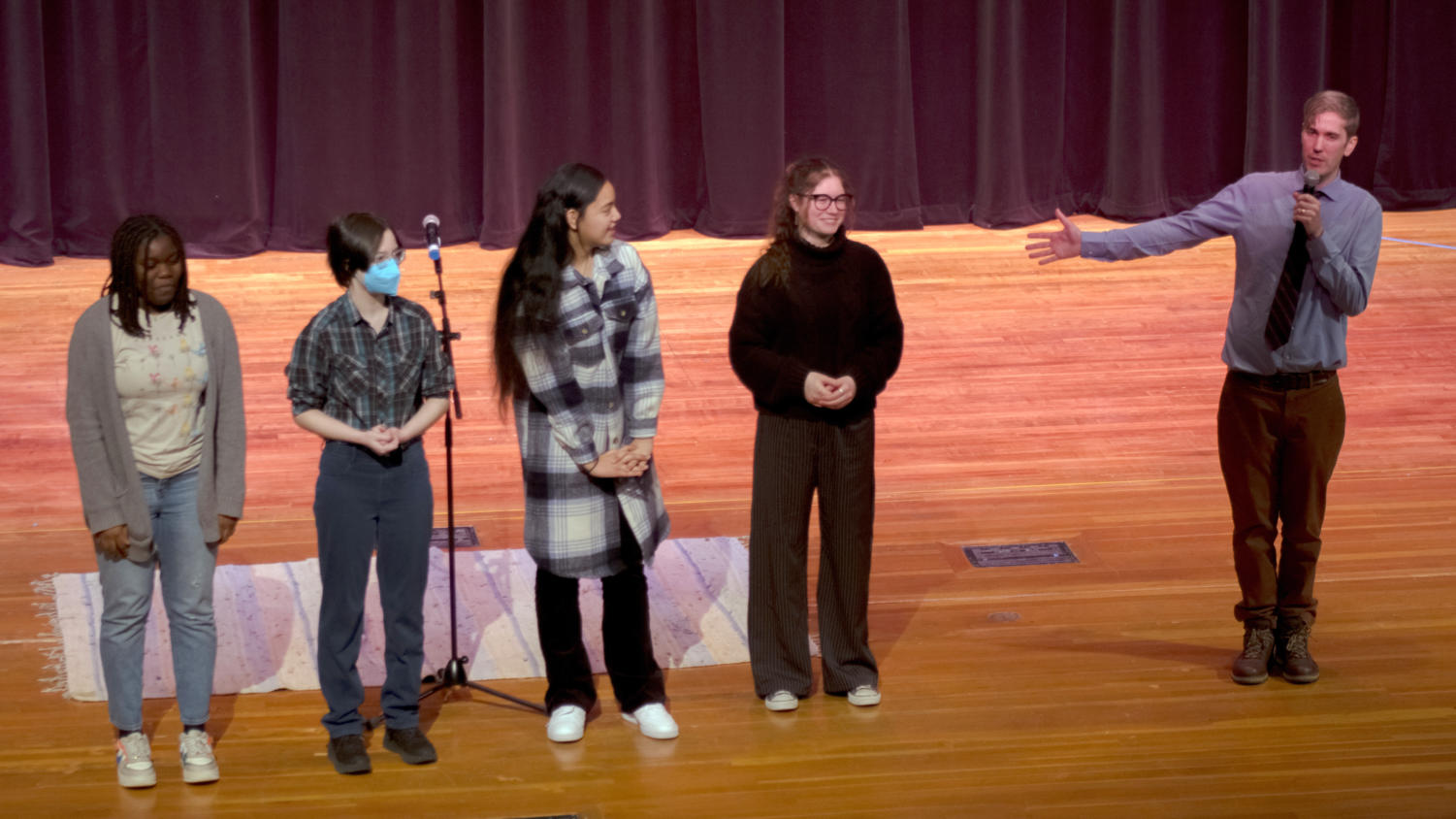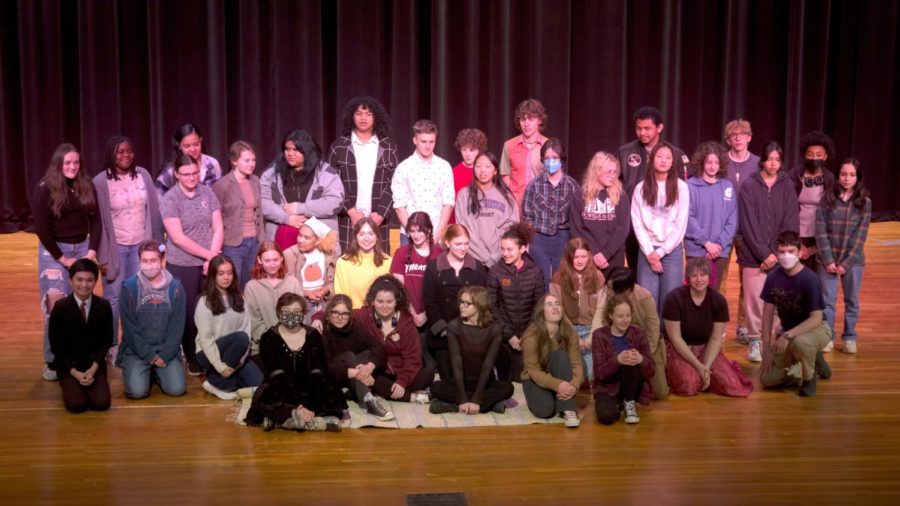Sophomores Sweep the 2023 Poetry Out Loud Competition
The auditorium was full of excitement and tension a few weeks ago as more than 40 brave West High students took the stage to recite a poem as part of a nationwide competition.
For Poetry Out Loud (POL) students must choose and memorize a poem from the official POL website. They then must recite the poem with appropriate tone, facial expressions, and stage presence. Competitors are graded by several teacher judges and winning scores often come down to the decimal point.
Four students: Brigitta Ta’aga, Edison Wallace Moyer, Mona Koko, and Vi Bowie won the competition and proceeded to the regional POL competition. Ta’aga and Bowie were among 10 regional winners who will travel to Juneau in March for the state competition. They will join students from all across Alaska.
To the surprise of West’s English teachers, all four school winners were sophomores. In past years, most students sent to the regional competition were juniors and seniors.
Rachel Kittoe, West’s POL coordinator, states, “Surprised is the right word…this is the first year we’ve had the younger crew representing us at regions, but I am happy for them. They did a phenomenal job and they earned their strong scores.”
The POL scoring rubric encompasses five different categories: confidence on stage, use of tone, dramatic appropriateness (nonverbal), evidence of understanding of poem, and overall performance.
West High has a long running history of success in POL. In 2015, Maeva Ordaz won the national level competition, won a $20,000 scholarship and got to meet Michelle Obama while at the national competition in Washington D.C. In 2021, Asya Gipson was among the Top 15 POL performers in the country.
Kittoe has been participating in POL affairs here since 2009. West was one of the earliest schools to take part in POL, as POL was launched by the Poetry Foundation in 2006. “Carolina Carr, a former Spanish teacher at West, asked me if I wanted to do [POL] with my students,” says Kittoe. “Carolina was the one who originally came up with the idea. She shared her idea and it grew.”
Many students join POL because teachers offer extra credit, but Kittoe says, “Judges try to pick students that show a lot of heart, and show that they’re really in it. Not just for extra credit. But, they’re in it because they really love the poem they’re reciting and they want to be able to share the excitement through their recitation. If you want to win, you need to have a genuine affection for the competition and poetry.”
Bowie, one of the four winners, made his passion for poetry very clear. “I really love to read and write poetry, but I don’t have as much practice with reciting it, so it was a new experience for me while still being related to my interests,” he said.
Bowie recited “Luke Havergal” by Edwin Arlington Robinson. For Bowie, the hardest part of the POL recitation was figuring out the interpretation of the poem. In fact, he chose “Luke Havergal” because of its ambiguous ending, “which allows the reader to interpret the poem’s moral for themselves.”
Kittoe noticed this same challenge for performers. “Performers need to make decisions about the way they want to perform the poem. Hand gestures, facial expressions, pauses, certain words they want to emphasize. Then, they can create almost a new meaning for the poem,” she says.
She also finds it interesting when she hears the same poem performed, but done in completely different ways. “The relationship between the writer and performer changes based on how someone performs their poem.”
Bowie also believes that poetry is a hugely underappreciated art form. “Lots of people aren’t really exposed to [poetry]. Many students never learn how to read poetry or, even more so, how to write it, and I think that if they did, there might be more of a realization that poetry, and poetry recitation, are actually pretty fun,” he says.
On the other hand, sophomore Ta’aga, says, “The hardest part was finding the time to rehearse over and over and then the peer pressure of trying not to sound like my voice was shaking while reciting.”
She mentioned her inner anxiety leading up to the performance, and how hearing other great performances daunted her. Fortunately, she was able to overcome her fears. “I told myself I did great. When I heard my name being said by the MC I was shocked and so happy I almost cried!”
Mona Koko, with her stellar recitation of the 72-line “Haiku and Tanka For Harriet Tubman”, was able to turn her fear into a tool. “The audience definitely made me nervous. I handled it by not looking at anyone directly in the face for a long period of time. I also knew the story behind my poem, so even when my voice was shaky and I felt anxious, I could use those emotions and incorporate them within the piece,” she said.

Conversely, Bowie seemed completely unfazed by the West crowd. “Being in front of a crowd is always a little terrifying,” says Bowie. “But I try to remember that the audience doesn’t care as much as I think they do. If I stumble over a word the audience will probably just forget about it within an hour anyway.”
Ta’aga brought up how her love for talking helped her to victory. “If you’re the type of person who talks a lot and likes talking like me, POL is an opportunity for you to recite whatever poem you choose and can make people listen to you without you asking for it.”
Kittoe and the four sophomores all advocated for more participation in POL, and hope that the student body will show more interest in future years. Both Koko and Kittoe mentioned the incentive of all expenses-paid trips.
Winners of the regional and state competitions fly to Juneau and Washington D.C, respectively. “When you make it to either the state competition in Juneau or the national competition in D.C, the prize is the trip. You get a free trip, lodging, food, and a parent/guardian can come with you. They also do a lot of poetry related things. They’ll have famous poets who run workshops about writing poetry or expressing poetry,” Kittoe says.
“Practice. Practice and get feedback from lots of different people,” recommends Kittoe to the sophomores. “Maeva and Asya, before going to the national competition, both practiced in front of different teachers.”
Koko gave shout-outs to her teacher and friends in her interview, stating, “….Mrs. Brogan…helped me throughout my learning of what this piece meant and how to properly perform it. I also would like to thank my friends for sitting through me reciting my poem over and over again.”
Kittoe also added, “As the POL coordinator, I get a lot of the credit, but POL is a group effort. Everybody is included and that’s why we’ve been doing so well for such a long time.”
It seems that West’s POL domination will continue, as Koko and Ta’aga say that they plan to do POL again. “I definitely will,” Koko declared. “POL was such an enjoyable experience for me and [being a competitive person] made me want to give it my all.”

